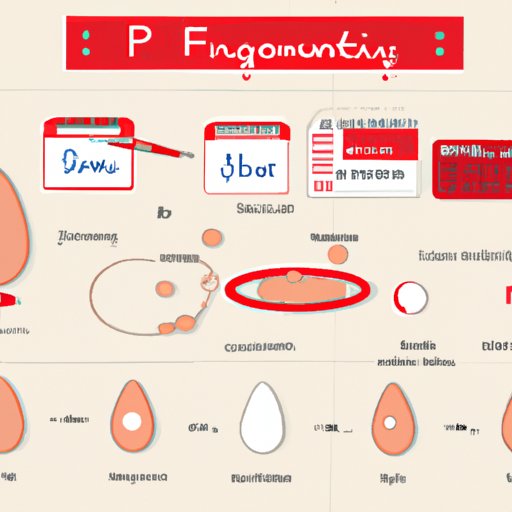Introduction
When it comes to trying to conceive, knowing when you are most fertile after your period is key. The timing of ovulation plays an important role in a woman’s ability to get pregnant, and understanding your post-period fertility cycle is essential for maximizing your chances of conception. This article explores the fertility window after a period and provides advice for increasing your chances of getting pregnant.
Exploring the Fertility Window: When Are You Most Fertile After Your Period?
In order to understand when you are most fertile after your period, it is important to have a basic understanding of ovulation and the fertility window. Ovulation is the process of mature eggs being released from the ovaries and traveling through the fallopian tubes into the uterus. It typically occurs around the middle of a woman’s menstrual cycle, or 14 days before the start of her next period. During ovulation, the egg is only viable for 12-24 hours, making this the optimal time for conception.
The fertility window is the time frame during which a woman is most likely to conceive. According to the American Pregnancy Association, the fertility window typically begins five days prior to ovulation and ends one day after ovulation. During this time, there is an increased chance of conception due to the presence of viable sperm and eggs that are capable of fertilization.
What to Know About Getting Pregnant After Your Period
Getting pregnant after your period can be tricky, as the exact timing of ovulation varies from woman to woman. While some women may ovulate shortly after their period ends, others may not ovulate until several weeks later. Additionally, the length of a woman’s cycle can also affect when she ovulates. For example, a woman with a shorter cycle may ovulate sooner than a woman with a longer cycle.
It is also important to note that while the fertility window typically lasts six days, the chances of conception are highest on the day of ovulation and decrease significantly after the 24-hour mark. Dr. Thomas Ruiz, OB-GYN at MemorialCare Orange Coast Medical Center in Fountain Valley, California, states, “The greatest opportunity for pregnancy is within 24 hours of ovulation, so it is important to know when that time is for each individual.”
Maximizing Your Chances of Conception: Understanding Your Post-Period Fertility Cycle
If you are trying to get pregnant after your period, there are several steps you can take to help maximize your chances of conception. One of the most effective methods is to track your cycle to pinpoint ovulation. This can be done by recording your temperature each morning and charting changes in cervical mucus throughout the month. Tracking your cycle can help you to identify when you are most fertile and increase your chances of conceiving.
Charting your cycle can also be beneficial in other ways. According to Dr. Ruiz, “Charting your cycle can provide valuable insight into your overall health and reproductive system. It can help to identify any potential issues that may be affecting fertility and allow for early intervention if needed.”
Conclusion
Understanding your post-period fertility cycle is essential for maximizing your chances of conception. The fertility window typically begins five days prior to ovulation and ends one day after ovulation, with the highest chance of conception occurring during the 24-hour period of ovulation. To increase your chances of getting pregnant after your period, tracking your cycle to pinpoint ovulation is key. Charting your cycle can also provide valuable insight into your overall health and reproductive system.
In conclusion, understanding when you are most fertile after your period is key to maximizing your chances of conception. By tracking your cycle and pinpointing ovulation, you can increase your chances of getting pregnant after your period.
(Note: Is this article not meeting your expectations? Do you have knowledge or insights to share? Unlock new opportunities and expand your reach by joining our authors team. Click Registration to join us and share your expertise with our readers.)
